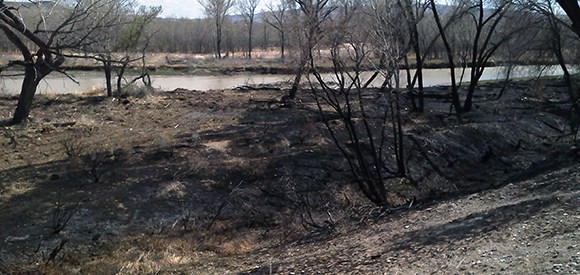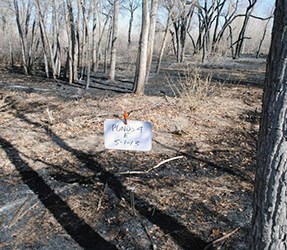Last updated: January 12, 2017
Article
Mastication Treatments Help Protect Unique Riparian Habitat
On April 27, 2013, the Big Fork fire started on private land near the Shoshone River in northern Wyoming. It quickly spread through a unique and critical riparian corridor called the Yellowtail Wildlife Habitat Management Area. When the 1,509-acre fire reached lands owned by Bighorn Canyon National Recreation Area, firefighters were able to capitalize on a recent mastication treatment and prevent the fire from spreading further onto the treasured landscape within the park.

On April 27, 2013, the Big Fork fire started on private land near the Shoshone River in northern Wyoming. It quickly spread through a unique and critical riparian corridor called the Yellowtail Wildlife Habitat Management Area. This special area is managed by the Wyoming Game & Fish Department under cooperative agreements with the National Park Service, the Bureau of Reclamation, and the Bureau of Land Management. It contains some of the best remaining cottonwood forest in Wyoming.
When the 1,509-acre Big Fork fire reached lands owned by Bighorn Canyon National Recreation Area, firefighters were able to capitalize on a recent mastication treatment and prevent the fire from spreading further onto the treasured landscape within the park. Interagency firefighters took advantage of the recent treatment area by burning off a dozer line, effectively stopping the fire.

Cooperators from the Wyoming Game & Fish Department have been using mastication to remove tamarisk and Russian olive infestations on the park and adjacent lands since 2007. These exotic shrubs threaten the wildlife values of the riparian forest and cause dangerous fuel buildups.
Untreated areas within the Big Fork fire burned with high severity, killing all cottonwood trees. Treatments where the slash had not yet been disposed of also burned hot. However, in completed treatments where slash was eliminated, burn severity was quite low and most of the cottonwood trees survived.
Contact: Diane Abendroth, fire ecologist
Email: e-mail us
Phone: (307) 739-3665 or (307) 739-3692
